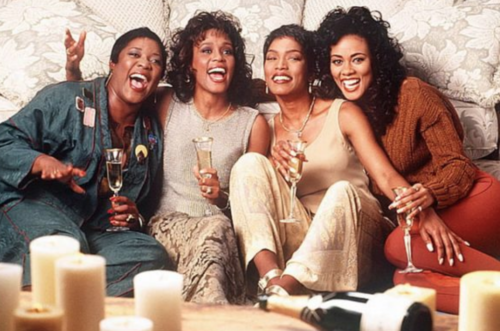Where the Bechdel test is concerned, there is no shortage of films, most especially from the final “glory days” of pre-#MeToo, that do not make the cut for avoiding scene after scene of women complaining about men. “He didn’t call me,” “he’s cheating on me,” “he’s gay,” etc. In the case of four single women (yes, Waiting to Exhale somewhat blazed the trail for Sex and the City), Savannah Jackson (Whitney Houston), Bernadine “Bernie” Harris (Angela Bassett), Robin Stokes (Lela Rochon) and Gloria Matthews (Loretta Devine), living in Phoenix, it seems that the universe will take no joy in allowing them to exhale. As in, stop holding their breath for “the right man.”
Even Bernie, married for eleven years to John (Michael Beach) under the assumption he’s the one, loses him to an affair with, of all people, a white girl. There’s a lot of vitriol about black men defecting from their own in favor of white women, and it stems from the original writer of the novel the film is based on, Terry McMillan, who co-wrote the script with Ronald Bass (eventually brought to life onscreen by Forest Whitaker). When the book was released in 1992, it was a runaway success in the same way perhaps we consider Fifty Shades of Grey to be now (though no one should have to be subjected to that comparison)–but at the cost of most men writing it off as misandry porn, as best exemplified from a review from The Independent at the time (by a woman no less), chiding, “People who have never read a book are buying [McMillan’s]. This is good news. But it does feel a bit like opening somebody else’s hate mail. If an African-American male had had the temerity to write like this about women, he wouldn’t be inhaling or exhaling.”
Alas, the “African-American male” was, as McMillan frequently pointed out throughout the novel, often too busy getting his dick wet to find much time for writing. And then there is the scorn on the part of the men themselves that in turn breeds more scorn from the women they disappoint on a constant basis. As one of Robin’s many failed attempts at a boyfriend, Troy (Mykelti Williamson), screams at her from her front yard when she refuses to let him in, “You black bitches is all the same. You complain all the time about how nobody want yo asses. Don’t know how to treat ya. Soon as a man or brotha shows you genuine interest, you bitches act simple. Then you wonder why we go out with white women.”
Ah, there it is again, the white pussy allusion, the ultimate sting in the wound of a black woman jilted. And as for Bernie, well, not even setting John’s car on fire (in one of the most beautiful scenes in 90s cinema history) can sate her lust for revenge. No, she has to do the only thing that can even mildly calm down a frantic and “hysterical” woman: cut all her hair off. And as the heat in Phoenix seems to mirror the temperature of Bernie’s choleric anger, Savannah tries to keep her cool in the wake of yet another flimsy lover (in a sex scene that makes you feel almost as used and receptacle-like as Savannah herself). To add to the pressure she feels about “finding a man before it’s too late,” as the stock phrase referencing becoming day old bread goes, her mother calls her on a constant basis to “check on her progress,” as it were. So concerned about Savannah finding someone, her mother even encourages an affair with Kenneth (Dennis Haysbert, better known as the All State guy), who is married and has a daughter, but claims so convincingly to love Savannah that she goes for it, against all her better judgment–for a while believing that maybe he really will leave his wife for her.
Throughout their collective struggles and letdowns with men, the ironic constant is that they all still want one–“every woman needs a man”–or so they believe. But by the time their own iconic Wayne’s World scene comes along (singing together in the car to Roberta Flack’s “It Might Be You,” which they all note was from Tootsie, a testament to white people pop culture being shoved down black people’s throats), it seems that they have unwittingly discovered that everything they’ve ever wanted, at least on an emotional level, comes from the friendship they have with each other. Yes, it’s all very “maybe we could be each other’s soul mates.” That the accursed biological indoctrination a woman seems to have for “needing” to attach herself to a man sometimes gives way to independence out of sheer necessity and self-preservation is elucidated in an understated extreme by these four women, initially so co-dependent at the outset of their story. But like Whitney says on the song that carried the soundtrack, “When you’ve got friends, to wish you well/You’ll find your point when you will exhale.” The hope is, you don’t kill yourself holding your breath before that revelation.





















